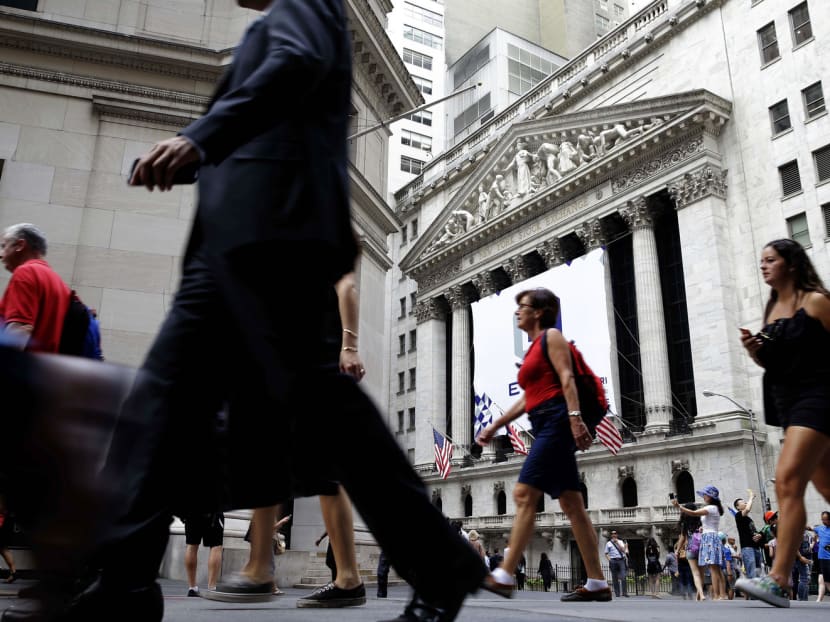Talk of US interest rate hike adds to global financial turmoil
SINGAPORE — Global stocks are headed for their biggest monthly loss in more than three years after United States Federal Reserve officials signalled at the weekend that they were prepared to raise interest rates even amid unprecedented turmoil in Chinese markets.

Sentiment on Wall Street took a dive yesterday after the US Federal Reserve vice-chairman suggested a September interest rate hike was still possible. Photo: AP
SINGAPORE — Global stocks are headed for their biggest monthly loss in more than three years after United States Federal Reserve officials signalled at the weekend that they were prepared to raise interest rates even amid unprecedented turmoil in Chinese markets.
Last month, more than US$5 trillion (S$7.06 trillion) was erased from the value of global shares as concerns that China’s economy may be in worse shape than previously estimated collided with investor worry about whether global growth can withstand higher US interest rates.
Bets on a September rate hike by the Fed climbed after vice-chairman Stanley Fischer said on Saturday that there is “good reason” to believe inflation will accelerate.
“Given the apparent stability of inflation expectations, there is good reason to believe that inflation will move higher as the forces holding down inflation dissipate further,” he told a central bankers’ annual conference in Jackson Hole, Wyoming.
Sometime soon — possibly as early as mid-September and probably no later than December — the Fed plans to raise its benchmark interest rate one-quarter of one percentage point, a mathematically minor move that has become a very big deal. The central bank has held short-term rates near zero since December 2008, and the imminent end of that era is one major cause of recent financial market turmoil.
The MSCI All-Country World Index was on track for a 6.6 per cent drop last month in late European dealings, the biggest such slump since May 2012. The Dow Jones Industrial Average opened about 0.8 per cent lower in New York yesterday, extending its decline for the month to 6.6 per cent, Bloomberg data showed.
MSCI’s Asia-Pacific gauge dropped 0.7 per cent yesterday for an 8.3 per cent slide in August, its fourth straight monthly retreat.
Among the key Asian bourses, China’s Shanghai Stock Exchange Composite clawed back from a decline of as much as 3.8 per cent intraday to close just 0.8 per cent lower at 3,205.99. Still, for the month of August, the main Chinese benchmark lost 12.5 per cent.
China had unexpectedly devalued the yuan by a record 1.9 per cent on Aug 11, which heightened concerns over a deepening malaise in the world’s second-biggest economy. Despite unprecedented measures by Beijing to shore up the market, Chinese shares have lost nearly 40 per cent of their value since mid-June, wiping out the equivalent of US$4.5 trillion in wealth — more than the size of Germany’s economy.
Shares in Singapore, whose largest trading partner and export destination is China, fell 1.2 per cent yesterday, with the Straits Times Index closing at 2,921.44 to bring the full-month loss to 8.8 per cent. Japan’s Nikkei-225 Index lost 1.3 per cent to chalk up a monthly decline of 8.2 per cent, while Hong Kong’s Hang Seng Index eked out a 0.3 per cent gain for the day to close the month down 12 per cent.
In currency markets, the Bloomberg-JPMorgan Asia Dollar Index, which tracks the region’s 10 most active currencies, excluding the Japanese yen, retreated by 2.6 per cent in August, the biggest monthly decline since May 2012.
Malaysia’s ringgit led losses as a slide in crude oil prices coincided with a political scandal involving Prime Minister Najib Razak, while the yuan devaluation heightened the risk of a currency war in the region to protect exports.
The ringgit lost another 0.2 per cent yesterday to 4.1925 versus the US dollar, bringing its decline last month to 9.4 per cent, the worst performance since 1998.
The ringgit fell 6.6 per cent during the month against the Singapore dollar to close at 2.9675 yesterday, after breaching the 3.00 level last week to hit a low of 3.0563.
The Singapore dollar slipped another 0.2 per cent yesterday to S$1.4122 per US dollar to chalk up a decline of 2.9 per cent for the month.
The yuan rose for the fourth day yesterday after Premier Li Keqiang signalled support for the currency following the devaluation that rattled global markets.
The yuan climbed 0.19 per cent to close at 6.3763 to the US dollar, taking its advance in the past four sessions to 0.6 per cent and paring its loss for August to 2.6 per cent. AGENCIES





